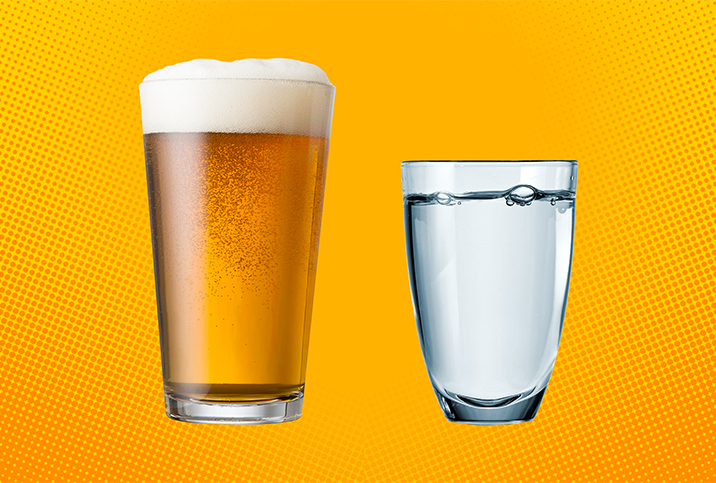The Struggle of Finding the Right Withdrawal Treatment Center

Addiction is a complicated, multifaceted issue that regularly faces harsh stigmatization, even in emergency rooms. As a society, we're quick to applaud sobriety but we too often turn our backs when people relapse.
If you want a prominent modern example of this situation, look no further than the case of John Mulaney, the once-beloved comedian whose quirky "I love my wife" brand earned him a fanbase of adoring young women, many of whom now question whether to support him after news broke in 2021 that he had relapsed and entered an addiction treatment center in Pennsylvania, left his wife and then had a baby with actress Olivia Munn after exiting rehab.
Supposedly, in Mulaney's ongoing tour, "From Scratch," he includes a joke where he says, "I'm a drug addict and everyone hates my baby."
Disregarding the issues concerning parasocial relationships for the moment, the discourse and controversy surrounding Mulaney's relapse highlight a much larger issue with how the American public regards addiction, which is often as a series of selfish, bad decisions rather than a lifelong mental disorder recognized by the Diagnostic and Statistical Manual of Mental Disorders, Fifth Edition (DSM-5).
The daily struggles of addiction
"Addiction is a chronic, relapsing brain disease that often includes a genetic component. Some people can drink or try a substance just once, but in the brain of someone with addiction, instinctively, their biology causes them to respond very differently," said Lawrence Weinstein, chief medical officer of American Addiction Centers, which is based in Tennessee and has treatment locations around the country. "With addiction, neural pathways in the brain are altered. The repeated spikes and crashes of dopamine caused by substances damage the brain's rewards system."
The fundamental difference in the neurochemistry of an addict compared to a nonaddict is pivotal to understanding what makes addiction difficult to quit, but also helps explain why nonaddicts struggle to grasp the realities of addiction. Nonaddicts don't chemically depend on the sensations derived from a substance; they can have a drink or two casually and call it a day, and they're fine spending most days sober.
Addicts don't enjoy the same luxury. Their bodies—and minds—crave and depend on these substances. There is a genuine, biological difference within the body that needs a certain substance to function. Even once someone becomes sober, these innate desires don't ever fully go away.
"Addiction is a disease that can be treated with medications and therapy to help the person work to consistently maintain their sobriety," Weinstein said. "But it is something that will always be with them."
Given the physical changes an addict experiences, trying to rid their system of a substance it depends on regularly results in painful, uncomfortable, even unbearable symptoms of withdrawal.
The ugly truth about withdrawal
"Withdrawal symptoms vary by substance and are affected by a number of factors, including that person's frequency of use," Weinstein said. "With alcohol, withdrawal can range from a hangover, which evidence suggests is a mild manifestation of alcohol withdrawal, all the way to death. The severity of withdrawal is complex for each person, and what one person may be able to tolerate could cause a fatal issue to arise in another."
The complexities of withdrawal only increase when discussing substances such as opioids, amphetamines and nicotine. Symptoms cover a wide range and affect different components of bodily function, such as blood pressure, heart rate and stomach issues. Some addicts suffering from withdrawal might sweat uncontrollably, have severe diarrhea or experience physical pain and heightened anxiety. Many times, these symptoms can be fatal.
The unpleasantness and risks of withdrawal add another layer of difficulty for addicts trying to get sober. In the throes of sweaty anxiety attacks and vomiting, it's far more appealing to use again knowing it will make you feel better.
Finding the right treatment center
Given the personal nature of addiction, withdrawal and recovery, quality programs should be tailored to the individual and their needs, but not all treatment centers are created equally. In fact, the current state of recovery programs is often exclusionary to certain people.
More than 73 percent of addiction treatment programs in the United States contain spirituality-focused components. For some, faith-based recovery might be a powerful motivator, but for others, it can come across as "preachy" or simply ineffective in the recovery process.
This was the experience of 34-year-old Kaylee D. (who asked for her last name to be omitted), who is nonreligious, identifies as queer and lives in the American South.
"Many of the rehab centers and Alcoholics Anonymous groups are really church indoctrination centers in disguise," Kaylee said. "The intersection of addiction and sexuality has been a little bit prickly for me.
"It would have been really tough to navigate without all the help I had," she added.
'Withdrawal is a spectrum and can manifest in a number of ways depending on the person.'
As part of her recovery, Kaylee moved in with her parents and established an alcohol-free environment. She then went to a 30-day inpatient rehab followed by a nine-week outpatient program for three hours every Monday, Wednesday and Friday. As a self-professed introvert, she admitted the meetings were difficult but proved "how desperate I was."
At first, she attended daily meetings as a way of "shopping around" for the right program, namely, one that wasn't faith-centric.
The prevalence of faith-based recovery programs, though, made this search difficult, and for some people, could act as a roadblock on the path to recovery. Additionally, some research suggests religious beliefs can negatively influence a person's attitude toward addiction and recovery, meaning some recovering addicts in faith-based programs might be receiving "treatment" that doesn't actually benefit them.
"Withdrawal is a spectrum and can manifest in a number of ways depending on the person," Weinstein said. "It's very difficult to tell what could happen to someone, which is why it's recommended to go through this process under medical professionals that can make it as painless as possible."
In their present state, the majority of addiction and withdrawal recovery programs have faith-based elements, and many of the individuals they serve share spiritual and religious beliefs. However, these programs have been criticized for their strict adherence to religious components in recovery, despite conflicting evidence that faith-based recovery is more effective than nonreligious recovery.
Consider, too, that individuals who have strong religious beliefs may be less likely to use addictive substances in the first place, which begs the question, "Who—or what—are these programs for?"
Addiction is, after all, a medical and psychological issue. For individuals such as Kaylee, psychiatry, therapy and support can be the most beneficial forms of recovery. There's certainly nothing wrong with relying on faith to guide you through the process, but we should acknowledge that adherence to spiritual and religious components may exclude more people than it includes.

















